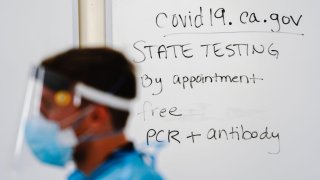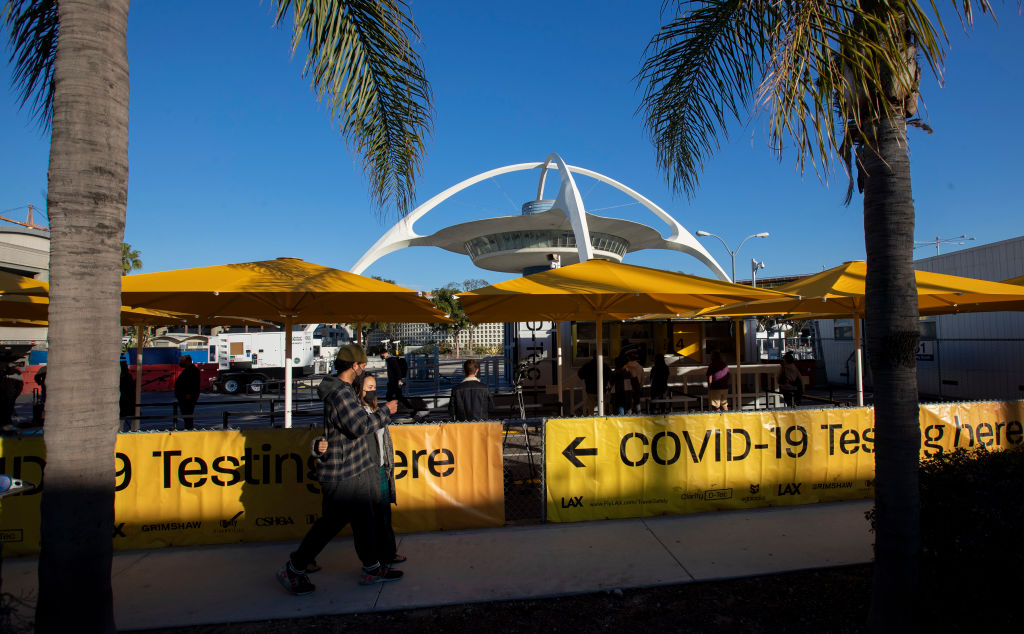
The pandemic is getting worse in Los Angeles as the coronavirus spreads rapidly within households and Californians let their guard down, according to Mayor Eric Garcetti, who said Sunday that the surrounding county is recording a new COVID-19 case every six seconds.
Garcetti said on the CBS program “Face the Nation” that he's concerned news of a vaccine rollout “has made everybody so hopeful” that they feel they can relax their behavior.
“We cannot. We cannot let up,” he said. “This is a virus that preys off of our weakness, preys off of our exhaustion."
Overall Los Angeles County, the nation's most populous with 10 million residents, is seeing high compliance of mask-wearing and people abiding by stay-home orders, Garcetti said. Despite that, the state is reporting enormous numbers of new cases, including more than 15,700 in Los Angeles County on Saturday.
“This is the fastest acceleration of new cases than at any other time during the pandemic,” the LA County Department of Public Health said in a statement.
The state Department of Public Health on Sunday reported another 181 deaths and more than than 45,350 new confirmed COVID-19 cases across California, bringing the case total to nearly 2.4 million.
More than 26,530 people have died from the virus in California, making it the third state to exceed 25,000 COVID-19 deaths since the start of the pandemic, behind New York with nearly 38,000 deaths and Texas with more than 27,000, according to a tally by Johns Hopkins University.
San Bernardino County east of Los Angeles said it had confirmed two cases involving a mutant variant of the coronavirus that appears to be much more contagious. Four cases were confirmed last week in San Diego County, and the variant has also been reported in Florida and Colorado.
The variant was found in two members of the same household in the Big Bear area who were tested for the virus Dec. 20, the San Bernardino County Department of Public Health said in a statement. One of them had contact with a traveler who returned from Britain on Dec. 11 and began to have COVID-19 symptoms three days later, officials said.
An investigation was launched to determine whether the traveler, also a resident of Big Bear, had the variant as well, or had infected others, county officials said Saturday.
Hospitals stretched to their limits will get help from California’s Fire and Rescue Mutual Aid System, which is most often used in response to wildfires, floods and other natural disasters. Paramedics and emergency medical technicians are being deployed for a 14-day “operational period” to assist emergency rooms and other hospital departments struggling with thin staffing, Gov. Gavin Newsom's Office of Emergency Services said in a statement Sunday.
More than 20,600 people were hospitalized across California as of Sunday with COVID-19; 4,500 of them were in intensive care, according to state records.
The southern half of the state has seen the worst effects, from the agricultural San Joaquin Valley to the Mexico border. Hospitals are swamped with patients and intensive care units don’t have any more beds for COVID-19 patients. Makeshift wards are being set up in tents, arenas, classrooms and conference rooms.
Ambulances were being forced to wait in bays as long as eight hours before they could transfer patients inside hospitals — and in some cases, doctors were treating patients inside ambulances, said Cathy Chidester, director of Los Angeles County’s Emergency Medical Services Agency.
Meanwhile, refrigerated trucks were on standby, ready to store the dead and mortuaries are turning away bereaved families because they’re running out of space.
Los Angeles County, which has a fourth of the state’s population of nearly 40 million, has seen 40% of its virus deaths. Garcetti said what's happening in Los Angeles should be a warning even for places with less population density.
“This is something now that really is spreading in the home,” Garcetti said. "What’s happening in Los Angeles can and will be coming to many communities across America. If you get two households together for Christmas, if you went to a New Year’s gathering — even if it was people you know and love so you thought it was OK — that’s when this virus exploits that weakness and is going far."



